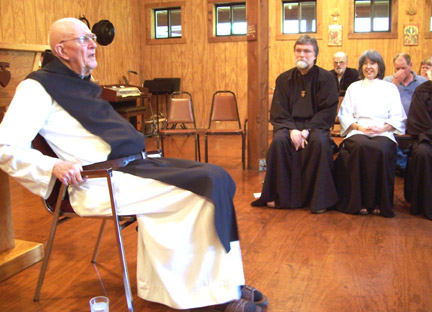
EUREKA SPRINGS -- Father Thomas Keating, OSCO, noted Trappist monk, abbot, author and founder of the centering prayer movement, presented a Contemplative Prayer Retreat Aug. 11-13 at the Little Portion Retreat and Training Center near Eureka Springs.
Following the retreat, which was booked months in advance and attended by participants from around the country, Father Keating offered a series of more intimate talks to the monastic and local domestic members of the Brothers and Sisters of Charity at their motherhouse, Little Portion Hermitage, Aug. 13-15.
"The greatest enemy of the false self is silence," Father Keating said.
He should know. Like most Trappist monks, he spends much of his time in silence. After attending Yale and graduating from Fordham University in 1943, Keating entered the austere monastic life at St. Joseph Abbey, the Trappist motherhouse in Spencer, Mass. He rose through the Trappist ranks from novice master to a 20-year term as abbot.
Father Keating took to heart the call for reform following the Second Vatican Council, especially the challenge for monastics to bring the contemplative life into the lives of the laity. By the early 1970s, he co-founded what became known as the centering prayer movement. He now resides at St. Benedict Monastery in Snowmass, Colo.
He leads the organization Contemplative Outreach, which is dedicated to moving contemplative prayer practice from the mystique of the cloistered monastic life into the daily life of the non-monastic laity.
In one of his talks at Little Portion, Father Keating contrasted Benedictine monk John Main's mantra-focused practice of contemplative prayer with the centering prayer method. While both methods can clear the mind, reduce stress and lead the practitioner closer to God, there are differences between emphases on both attention and intention.
Rather than focusing on a word, such as Main's suggested "maranatha," centering prayer seeks, as Father Keating explained, "to let go of all thoughts, feelings and sensations."
This "evacuation process" he described as a complete "surrendering of the false self." The priest likened the "false self" to what some psychologists deem the "super-ego" or what St. Paul referred to as his "old man."
Quoting Jesus in Matthew 6:6, Father Keating led his listeners into a deeper understanding of what Christ was referring to when he said, "Go to your inner room, close the door and pray to your Father in secret."
The priest maintains that letting go of every movement of the false self allows one to move more deeply into their own "inner room" to abide in God. He recommended "a twice-daily discipline of 20 minutes of time in total silence, with eyes closed and heart open, to set both our intention and attention on God alone.''
Father Keating led the Little Portion participants in centering prayer exercises at the end of each of his sessions.
"Resist no thought; retain no thought" he instructed as they "consented" to God and "unloaded" anxieties and recurring thoughts. Following the 20-minute practices, the Lord's Prayer was said in unison.
John Michael Talbot, founder and general minister of the Brothers and Sisters of Charity and author of a book about contemplative prayer, "Come to the Quiet," reflected on Father Keating's visit and teachings.
"We practice similar methods of contemplative prayer in our daily rhythm of life here at Little Portion," he said. "We chant Morning Prayer and incorporate sung vespers into our evening prayers. Having Father Keating here has blessed us and deepened our own commitment to daily meditation and contemplative practices."
Please read our Comments Policy before posting.
Article comments powered by Disqus The devil? Don't 'self-diagnose': follow Church guides
The devil? Don't 'self-diagnose': follow Church guides
 Planned Parenthood’s report shows increase in abortions
Planned Parenthood’s report shows increase in abortions
 Studio 3:16 offers new approach to teaching religion
Studio 3:16 offers new approach to teaching religion
 After three decades, NLR principal plans to retire
After three decades, NLR principal plans to retire
 CHS athlete overcomes odds to reach collegiate goal
CHS athlete overcomes odds to reach collegiate goal
 St. Joseph a model of solidarity with immigrants
St. Joseph a model of solidarity with immigrants
 Two gifts after Jesus’ death: Virgin Mary and Eucharist
Two gifts after Jesus’ death: Virgin Mary and Eucharist
 Why we have an altar, and not just a communion table
Why we have an altar, and not just a communion table
 Pope: Wars should be resolved through nonviolence
Pope: Wars should be resolved through nonviolence
 Living relationship with Jesus Christ in the Eucharist
Living relationship with Jesus Christ in the Eucharist